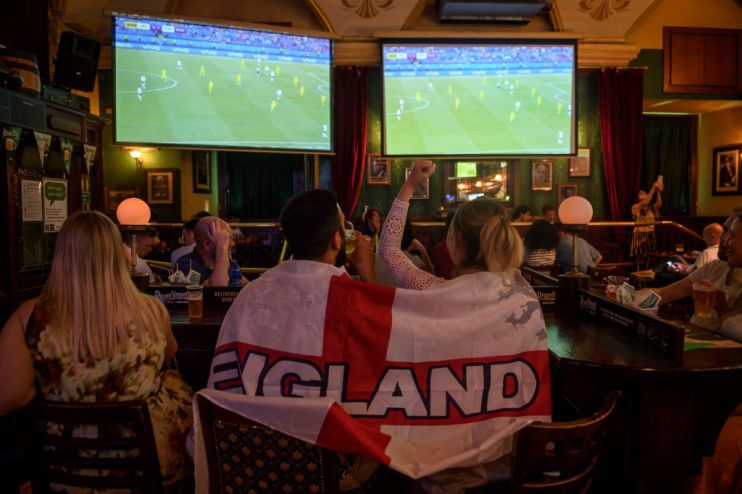Euro 2020: What an England win could mean for the UK economy

“England don’t do that – they don’t win those types of games” so said a friend after the three lions beat Denmark 2-1 after extra time in their Euro 2020 semi-final on Wednesday.
They do – just once every 55 years.
Scenes of jubilation across London after Gareth Southgate’s men reached their first final since 1966 were well documented, with the trademark pint throwing seen in pubs across the capital when Harry Kane scored the winning goal in the 104th minute of the game.
Read more: England perfect the art of timing to arrive at Euro 2020 final against Italy in peak condition
But what impact has all this joy had on the economy?
“For a UK economy that has been battered by Covid these last 15 months… the events of the last two weeks are likely to be a welcome tonic” Michael Hewson, chief market analyst at CMC Markets, thinks.
Susannah Streeter, senior investment and market analyst at Hargreaves Lansdown, agrees:
‘’An England win is likely to unleash the feel good factor and a surge in celebratory spending.”
The lifting of Covid restrictions was already fuelling stronger economic activity, pushing up output as consumers rushed back to high streets, leisure and hospitality businesses for the first time in months and sections of the economy reopened.
Figures from Barclaycard show that even before the tournament started on 11 June, consumer spending was running hot, up 7.6 per cent in May of this year compared to the same month in 2019 – before Covid.
Going to the pub, saving the economy
That initial burst in spending at retail stores then suddenly poured into pubs and bars once the tournament kicked off.
“For pubs especially, even with the social distancing restrictions, the ability to stream live sport and the progress the England team has made to the final, should offer a boost in terms of alcohol and food sales” Hewson added.
Analysts at the British Beer and Pub Association estimated that 9.7m pints were drank in England during the semi-final. That means nearly one in every six of us bought a pint that evening – staggering.
Read more: Extra bank holiday if England wins Euro 2020 final? Boris Johnson keeps us guessing
The same organisation thinks the country will consume 7.1m pints on the day of the final. Disappointingly small, but still not to be sniffed at.
The surge in supporters flocking back to pubs to watch the football has provided a windfall for many of them after months of being shuttered due to Covid. High-profile football matches often provided a crucial revenue bump for pubs before the pandemic.
However, experts noted that ongoing restrictions on trading including social distancing and table capacity limits have actually curbed the amount of income pubs and bars would have taken if the Euros had been happening without any restrictions.
The BBPA thinks pubs will lose out on nearly £9m in beer sales during the final, which will mean they sell 2.4m fewer pints during the match.
Read more: Good times never seemed so good: The Coldstream Guards get Euro 2020 fever
Scarcity of seats at pubs for the games as a result of high demand has prompted consumers to recreate the match-day atmosphere at home. Supermarkets have taken a fillip from people buying essentials (booze) ahead of each England game at the tournament.
“While it’s obvious that pubs and bars will have benefited from increased footfall, supermarkets and delivery apps are likely to have received a sales boost too” Robert Alster, chief investment officer at Close Brothers Asset Management, noted.
Sports retailers have also seen an uptick in their income due to surging demand for merchandise.
A tale of two-halves
The crest of the Euros wave sections of the economy are currently riding is likely to be short-lived, analysts said.
“Italia’90 rekindled Britain’s love affair with football after the miseries of the 1980s, on and off the pitch, but you would be hard-pushed to say it made a huge difference to the economy or markets in the long run” Russ Mould, investment director at AJ Bell, thinks.
Fundamental headwinds present strong downside risks that are likely to stifle economic growth.
“Issues such as the pandemic, unemployment and frightening levels of Government, corporate and consumer debt, as well as the spectre of inflation (the cruellest tax of all) will have far greater implications for the economy and the markets over the long run, no matter what the result on Sunday evening” Mould added.
Latest GDP figures also show the economic rebound from the pandemic is losing momentum. Though output grew 0.8 per cent in May, it was much slower than April’s 2.3 per cent jump.
Read more: UK economy grows 0.8 per cent in May
“One 90-minute (or 120-minute) football match is not going to change [issues] across industries which may be affected [by Covid], let alone those that are not” Mould warns.
It’s coming…
Chancellor Rishi Sunak thinks consumer confidence will strengthen sharply if England win their first final since that famous World Cup triumph in 1966.
Parallels can be drawn between predictions about where the economy is heading over the coming months and whether England will bring it home on Sunday.
Both are often premature, but rooted in confidence, not arrogance.
Read more: Three days to go: England in Euro 2020 final ‘better than my daughter’s birth’